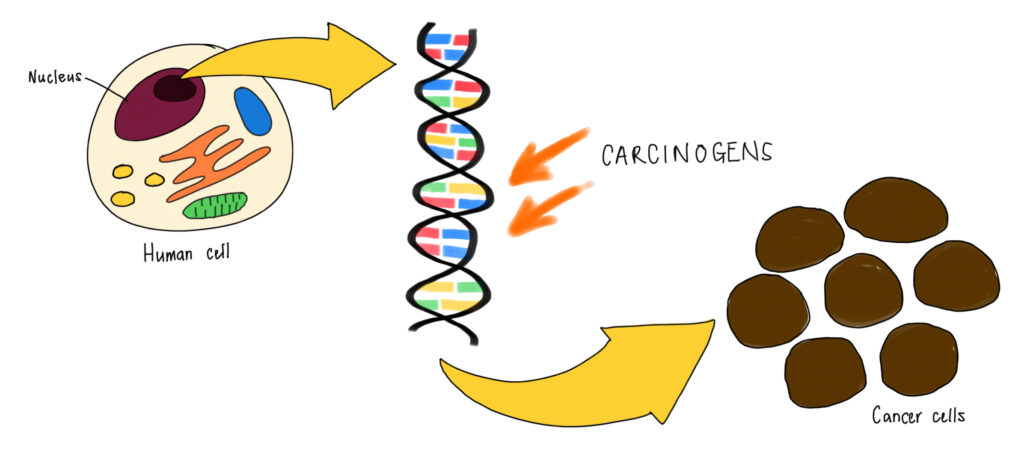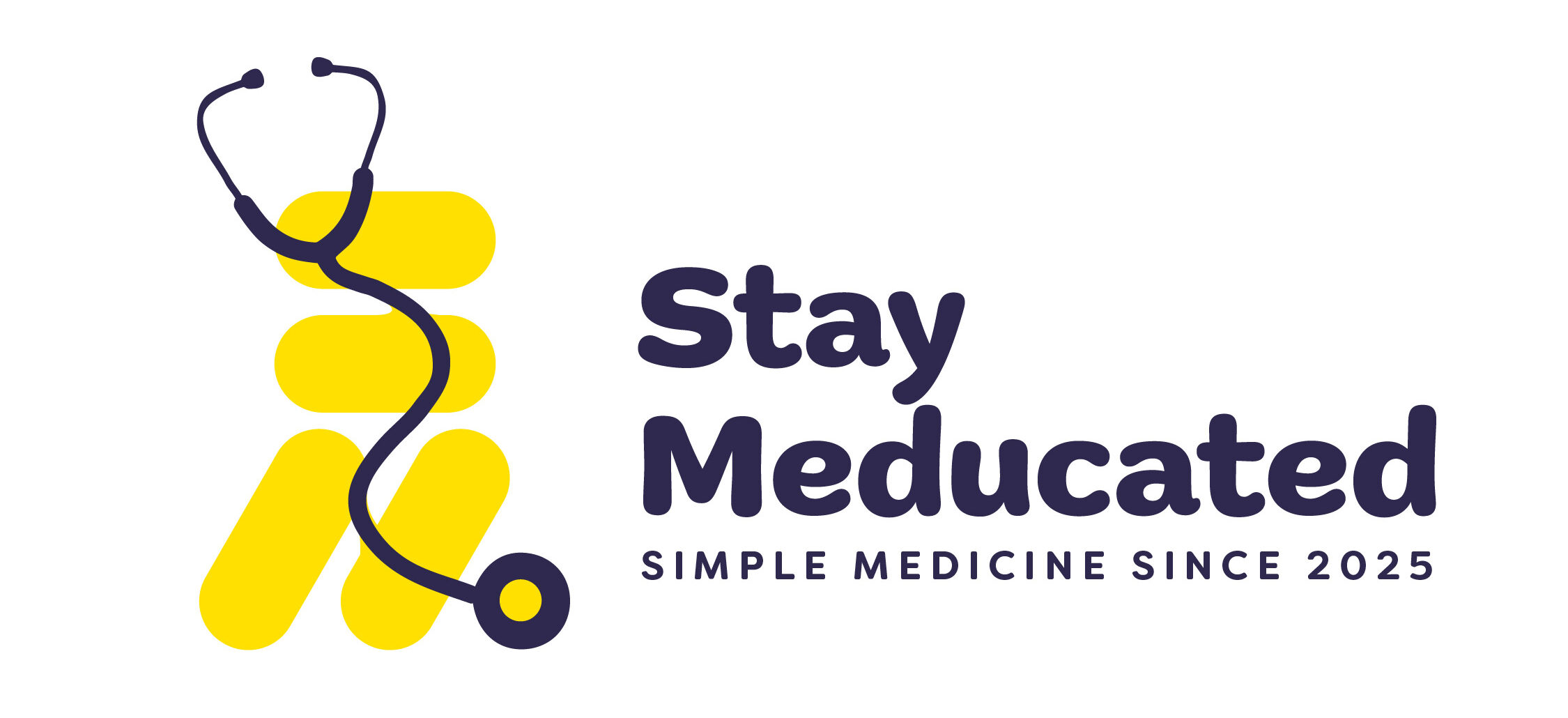A few months back, I found myself in the middle of a classic family debate — you know, the kind where the older generation swears that “everything we eat these days causes cancer.” Usually, I try to steer clear of those chats because, let’s be honest, once people have made up their minds, there’s no changing them. But this time, as I listened more closely, I realised something: I didn’t actually know that much about what chemicals or harmful substances are in our food — and whether any of them really cause cancer. That curiosity sent me down a rabbit hole of reading and researching, and now I’m bringing you along for the ride. Let’s learn together, yeah?
So, what is a carcinogen?
In simple terms, a carcinogen is anything – a chemical, substance, or even an organism – that can cause cancer (1). And it’s not just the stuff made in factories. Some carcinogens occur naturally. Think UV rays from the sun or certain viruses; both are natural, both are capable of causing cancer.
But the ones people often worry about are the man-made carcinogens, like the ones in some foods, building materials (like asbestos), or tobacco smoke. Some common examples include:
- X-ray and CT scan radiation
- Tobacco smoke
- Alcohol
- Arsenic (yes, that scary one — and it can even occur naturally in the air!)
- Certain bacteria, viruses, or parasites
- Processed meats — these are meats changed by salting, curing, or smoking. So just because it’s vacuum-packed from the store doesn’t mean it’s processed. Think smoked ham or corned beef. And remember: not all processed meats have carcinogens.
A Little Cell Science …
Inside our bodies, we’ve got billions of cells that form tissues, organs, and organ systems like the respiratory or digestive systems. These cells are full of proteins, hormones, and other chemicals that help us function. At the heart of all this is DNA — our body’s instruction manual, stored in each cell’s nucleus.
Carcinogens directly affect DNA which is how they cause cancer. Once DNA is altered, the cell may start building faulty parts, leading to abnormal cells [Figure 1]. Normally, your body can detect and clear these misfit cells. But when it doesn’t – or can’t – those cells can grow out of control, forming tumours. That’s how cancer develops, and it can happen almost anywhere in the body (2).

Figure 1 – Diagram showing how carcinogens attack and damage DNA, leading to cancer cells. Created by Dr Mojibola Orefuja
That said, not every exposure to a carcinogen automatically means you’ll get cancer. Whether or not a carcinogen actually causes cancer depends on two things: how potent it is, and how much or how often you’re exposed to it (3).
Take tobacco, for example, arguably the most well-known and dangerous carcinogen. It’s got high potency, meaning even small amounts can increase your risk of cancer. That’s why doctors are always urging people to quit smoking. But even if you don’t smoke, just being around smokers (passive smoking) can raise your risk because of prolonged exposure. Now think of food in that same way. Some ingredients or preservatives might have high carcinogenic potency, while others might only become harmful after repeated exposure, like eating certain things every day for years.
To help with this, the International Agency for Research on Cancer (IARC) has created a classification system that sorts substances based on how likely they are to cause cancer according to established research (4).

Figure 2 – Infographic demonstrating the classification of carcinogens according to established evidence regarding them. Obtained from source 4.
Which foods can cause cancer?
Now, contrary to popular belief (and viral posts), very few foods have actually been proven to contain carcinogens or cause cancer (5). Here are the main ones with solid scientific backing (8):
- Processed Meats – We touched on this earlier: meats that have been preserved through methods like salting, curing, or smoking. Think hot dogs, corned beef, canned meats, and ham (6). These have been linked to stomach and bowel cancers. It could be due to the preservatives or even the chemicals in the animal feed. According to the IARC chart, these are Class 1 Carcinogens — the most serious category.
- Red Meats – I know, this one hurts. Red meat has been linked to bowel, pancreatic, and prostate cancer. But before you swear off red meat completely, hear me out: red meat is considered a Class 2A carcinogen, which means the evidence in humans is limited. Most studies were done on animals. So while it’s smart to cut back, don’t swear off red meat entirely. Experts suggest limiting it to around 65–100g per week to keep things balanced.
- Alcohol – Another Class 1 Carcinogen. Alcohol has been linked to several types of cancer – from liver and breast to mouth and throat cancers. This food (or drink) type is exposure-dependent. So while the occasional drink isn’t as risky, long-term, heavy drinking definitely is. That said, everyone’s body reacts differently to alcohol. What affects one person might not affect another the same way. Just something to keep in mind.
BBQ or charred meats – some research suggests that barbecued or charred meats can increase the risk of certain cancers. This is because during the high-temperature cooking process, some harmful chemicals can be created (7, 9).
As you can see from that list, not many foods have actually been found to cause cancer. So auntys and uncles, don’t believe everything you see online. The list below shows you some of the foods with NO evidence of direct cause of cancer (5):
- Coffee
- Tinned or canned vegetables
- Soy
- Burnt toast
- Acidic foods
Now don’t get me wrong, some of these foods can indirectly lead to cancer through things like obesity, diabetes and other forms of organ damage, but they have no direct link to cancer formation themselves.
Can food prevent cancer?
This is where things get a bit disappointing. I wanted to find foods that actively reduce the risk of cancer – really, I did. But the evidence just isn’t strong enough to say any one food can protect you from cancer. That said, eating a healthy, balanced diet definitely helps your body function well and lowers your overall disease risk. So don’t ditch those veggies just yet.
I honestly enjoyed learning all this, and I hope it helped you better understand which foods to be mindful of. If you’ve got any burning questions or want me to look into something else, please leave a comment!
References
- National Human Genome Research Institute. Carcinogen [Internet]. 2023 [cited 2025 Jun 21]. Available from: https://www.genome.gov/genetics-glossary/Carcinogen
- Cleveland Clinic. Carcinogens: What Are They, and How Do They Cause Cancer? [Internet]. 2023 [cited 2025 Jun 21]. Available from: https://my.clevelandclinic.org/health/articles/25081-carcinogens
- National Research Council (US) Committee. Risk Assessment of Hazardous Air Pollutants [Internet]. Washington (DC): National Academies Press (US); 2004 [cited 2025 Jun 21]. Available from: https://www.ncbi.nlm.nih.gov/books/NBK232619/
- Compound Interest. A Rough Guide to Carcinogen Classifications [Internet]. 2023 Jul 14 [cited 2025 Jun 21]. Available from: https://www.compoundchem.com/2023/07/14/carcinogens/
- Cancer Research UK. Food myths and cancer – the facts [Internet]. 2023 [cited 2025 Jun 21]. Available from: https://www.cancerresearchuk.org/about-cancer/causes-of-cancer/cancer-myths-questions/food-myths
- Aetna International. Foods and cancer – Fit for Duty Report [Internet]. 2023 [cited 2025 Jun 21]. Available from: https://www.aetnainternational.com/content/dam/aetna/pdfs/aetna-international/Explorer/Aetna-B2C-Fit-For-Duty-Foods.pdf
- Cross AJ, Sinha R. Meat-related mutagens/carcinogens in the etiology of colorectal cancer. Environ Mol Mutagen. 2004;44(1):44–55.
- Reddy BS, Kelloff GJ. Diet and chemoprevention of colorectal cancer. In: Nutritional Oncology. 2nd ed. Springer; 2002. p. 293–304.
- Malolan R, Karuppasamy S. A comprehensive review on the formation of carcinogens from food products with respect to different cooking methods. Curr Res Nutr Food Sci J. 2021;9(2):447–60.

Great job. This is a balanced write up. Meanwhile I am aware some use pesticides , harmful fertilizers etc on vegetables and fruits .
What do you have to say to this . I also believe it’s ones responsibility to know how what one eats was preserved or as much as possible sourced . I always suggest grow basic vegetables around you for daily use. And if one has any family history of any cancer. Such must take extra precautions in lifestyle changes and not take chances . Routine medical check up must not be taken lightly too
Thank you for the insight. This is really important advice!